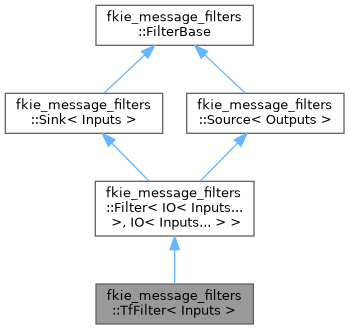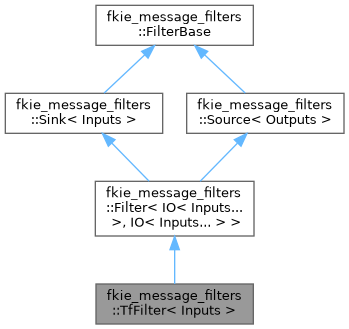Wait for TF transformations for incoming messages. More...
#include <fkie_message_filters/tf_filter.hpp>


Public Types | |
| using | FilterFailureCB = std::function< void(const Inputs &..., TfFilterResult)> |
| Callback for failed transform queries. | |
| using | Input = IO< Inputs... > |
| Grouped input types. | |
| using | Output = IO< Outputs... > |
| Grouped output types. | |
| using | V_string = std::vector< std::string > |
Type alias for std::vector<std::string> | |
Public Member Functions | |
| TfFilter () noexcept | |
| Empty constructor. | |
| TfFilter (tf2::BufferCore &bc, const std::string &target_frame, uint32_t queue_size) noexcept | |
| Construct and initialize the filter. | |
| TfFilter (tf2::BufferCore &bc, const V_string &target_frames, uint32_t queue_size) noexcept | |
| Construct and initialize the filter. | |
| Connection | connect_to_sink (Sink< Outputs... > &dst) noexcept |
| Connect this source to a sink. | |
| Connection | connect_to_source (Source< Inputs... > &src) noexcept |
| Connect this sink to a source. | |
| virtual void | disconnect () noexcept override |
| Disconnect from all connected sources and sinks. | |
| void | disconnect_from_all_sinks () noexcept |
| Disconnect from all connected sinks. | |
| void | disconnect_from_all_sources () noexcept |
| Disconnect from all connected sources. | |
| void | init (tf2::BufferCore &bc, uint32_t queue_size) noexcept |
| Initialize the filter. | |
| void | reset () noexcept override |
| Reset filter state. | |
| void | set_filter_failure_function (FilterFailureCB cb) |
| Register callback for failed transforms. | |
| void | set_target_frame (const std::string &target_frame) |
| Choose the TF target frame. | |
| void | set_target_frames (const V_string &target_frames) |
| Choose the TF target frames. | |
Static Public Attributes | |
| static constexpr std::size_t | NUM_INPUTS = sizeof...(Inputs) |
| Number of input arguments. | |
| static constexpr std::size_t | NUM_OUTPUTS = sizeof...(Outputs) |
| Number of output arguments. | |
Protected Member Functions | |
| void | receive (helpers::argument_t< Inputs >... in) override |
| Process incoming data. | |
| void | send (helpers::argument_t< Outputs >... out) |
| Pass data to all connected sinks. | |
Detailed Description
class fkie_message_filters::TfFilter< Inputs >
Wait for TF transformations for incoming messages.
This filter is intended to be used with a Subscriber as source, and will delay incoming messages until they can be transformed to the specified TF target frames. If the filter input is not unary, only the first argument is examined.
Member Typedef Documentation
◆ Input
|
inherited |
Grouped input types.
This type can be used to define sources with matching types.
◆ Output
|
inherited |
Grouped output types.
This type can be used to define sinks with matching types.
Constructor & Destructor Documentation
◆ TfFilter() [1/3]
|
inlinenoexcept |
Empty constructor.
Constructs an uninitialized filter object. You need to call init() before you can use the object.
◆ TfFilter() [2/3]
|
noexcept |
Construct and initialize the filter.
The constructor calls init() and set_target_frame() for you.
bca tf2 buffer instancetarget_framethe TF target frame for the incoming messagesqueue_sizethe maximum number of queued messages
- Exceptions
- Does not throw any exceptions.
◆ TfFilter() [3/3]
|
noexcept |
Construct and initialize the filter.
The constructor calls init() and set_target_frame() for you.
bca tf2 buffer instancetarget_framesthe TF target frames for the incoming messagesqueue_sizethe maximum number of queued messages
- Exceptions
- Does not throw any exceptions.
Member Function Documentation
◆ connect_to_sink()
|
noexceptinherited |
Connect this source to a sink.
Can be called multiple times to connect multiple sinks; in that case, the sinks receive data in the same order as they have been connected. This function does basically the same thing as Sink::connect_to_source(), only from the opposite point of view.
dstthe sink that is to be connected
- Returns
- a connection object that can be used to monitor or sever the created connection
- Exceptions
- Does not throw any exceptions.
◆ connect_to_source()
|
noexceptinherited |
Connect this sink to a source.
Can be called multiple times to connect multiple sources; in that case, the sink receives data from all connected sources. This function does basically the same thing as Source::connect_to_sink(), only from the opposite point of view.
srcthe source that is to be connected
- Returns
- a connection object that can be used to monitor or sever the created connection
- Exceptions
- Does not throw any exceptions.
◆ disconnect()
|
overridevirtualnoexceptinherited |
Disconnect from all connected sources and sinks.
Convenience function that calls disconnect_from_all_sources() and disonnect_from_all_sinks().
- Exceptions
- Does not throw any exceptions.
Reimplemented from fkie_message_filters::Sink< Inputs >.
◆ disconnect_from_all_sinks()
|
noexceptinherited |
Disconnect from all connected sinks.
Severs the connection to all sinks, turning the send() method into a no-op.
- Exceptions
- Does not throw any exceptions.
◆ disconnect_from_all_sources()
|
noexceptinherited |
Disconnect from all connected sources.
Severs the connection to all sources. The receive() method will not be called any more.
- Exceptions
- Does not throw any exceptions.
◆ init()
|
noexcept |
Initialize the filter.
This function allocates internal data structures and makes the filter operational. If the function is called on an already initialized filter, the filter is reinitialized and reset() is called implicitly.
bca TF2 buffer instancequeue_sizethe maximum number of queued messages
- Exceptions
- Does not throw any exceptions.
◆ receive()
|
overrideprotectedvirtual |
Process incoming data.
Derived classes need to override this method to handle all data that is to be consumed by the sink.
- Exceptions
- Depends on the implementation.
Implements fkie_message_filters::Sink< Inputs >.
◆ reset()
|
overridevirtualnoexcept |
Reset filter state.
Discards all queued messages. Existing connections to sources and sinks are unaffected.
- Exceptions
- Does not throw any exceptions.
Reimplemented from fkie_message_filters::FilterBase.
◆ send()
|
protectedinherited |
Pass data to all connected sinks.
outdata
- Exceptions
- Does not throw any exceptions, but will propagate uncaught exceptions from filter callbacks.
◆ set_filter_failure_function()
| void fkie_message_filters::TfFilter< Inputs >::set_filter_failure_function | ( | FilterFailureCB | cb | ) |
Register callback for failed transforms.
Whenever a message is discarded, this callback is called with the message and the reason why the TF transform failed.
cbcallback function
- Exceptions
-
std::logic_error if the filter is uninitialized
◆ set_target_frame()
| void fkie_message_filters::TfFilter< Inputs >::set_target_frame | ( | const std::string & | target_frame | ) |
Choose the TF target frame.
target_frameall passed messages will be transformable to this TF frame
- Exceptions
-
std::logic_error if the filter is uninitialized
◆ set_target_frames()
| void fkie_message_filters::TfFilter< Inputs >::set_target_frames | ( | const V_string & | target_frames | ) |
Choose the TF target frames.
target_framesall passed messages will be transformable to all these TF frames
- Exceptions
-
std::logic_error if the filter is uninitialized
The documentation for this class was generated from the following files:
- include/fkie_message_filters/tf_filter.hpp
- include/fkie_message_filters/tf_filter_impl.hpp